Archive for July, 2009
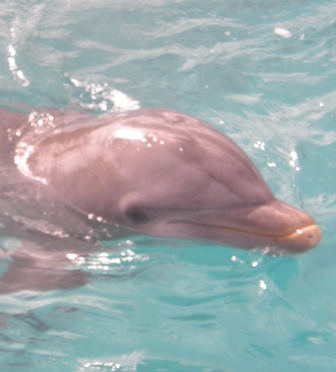
More dolphins held captive
 (CNS): Two more dolphins have arrived in the Cayman Islands and have been taken to the captive facility at Dolphin Discovery in North West Point Road. According to a release from the company the two Atlantic Bottlenose marine mammals arrived last Friday, bringing the total number of Dolphins held at the marine facility to eight. The Department of Environment confirmed that the two marine mammals, which have reportedly come from Tortola, had CITES certificates. However, the facility still does not have an operating license.
(CNS): Two more dolphins have arrived in the Cayman Islands and have been taken to the captive facility at Dolphin Discovery in North West Point Road. According to a release from the company the two Atlantic Bottlenose marine mammals arrived last Friday, bringing the total number of Dolphins held at the marine facility to eight. The Department of Environment confirmed that the two marine mammals, which have reportedly come from Tortola, had CITES certificates. However, the facility still does not have an operating license.
There are now 14 dolphins held in captivity in the Cayman Islands at two different facilities in West Bay, both of which have caused considerable controversy as a result of the declining acceptability world wide for what is seen by many as an exceptionally cruel form of entertainment.
Billy Adam, Cayman’s leading activist against what he calls the dolphin ‘abusement’ industry, said he was sickened by the arrival of yet more dolphins in Cayman and continues to be appalled by the government’s failure to uphold the law surrounding the facilities. “The attorney general, the police, the Department of Agriculture and now the new government are all allowing a blatant disregard of the law, as this facility as well as Dolphin Cove are carrying on their abusive entertainment business without operating licences as required under the law,” he said.
He also noted that the standards by which the two facilities are supposed to be operating are still a secret. Adam explained that the two facilities say they adhere to the standards set by the US Alliance of Marine Mammal Parks, a private association which will not publicize what those standards are.
“This business is an appalling, corrupt, deceptive and cruel trade and we are allowing these people to operate in contravention of our laws and we are not even able to see what standards it is that they are supposed to abide by,” Adam added.
Although the latest two dolphins have arrived from Tortola from the firm’s facility there with CITES certificates, Adam lamented the fact that the Cayman government is not conducting audits regarding the real origin of the creatures, tracking exactly where they came from and how they were actually captured.
“We are dependant on what other nations say is the case when it comes to the CITES certificate. There is no audit done to see if the governments from where these dolphins come from have been honest about their origins. As a result there can be no guarantee that these creatures do meet CITES standards. No one in our government wants to ask difficult questions so they cancontinue with this plausible deniability.”
Adam stated that the entire industry is dependent on corrupt practices but it seems that the government denies the brutality and those making the money do not care about it. “This cruel industry could not operate without corruption, and anyone who saw the showing of the ‘Cove’ recently can testify to that,” he said. “We cannot know that these animals did not leave young dolphins who are still dependent on their mothers, even after that have stopped feeding, to learn things like migration routes and feeding grounds. Left without their mothers the baby dolphins will starve to death.”
The DoA has confirm that staff from the department were there to check the dolphins on arrival and that the paperwork was in order. DoA vet Dr. Gikonyo checked the well-being of the dolphins and said they were exhibiting normal behavior including eating. The DoA however is responsible for the Operating Licenses for the facilities and it has not yet drawn up the regulations that will ultimately provide the legal framework should they ever be granted in accordance with the law.
The Water Authority confirmed that they had been contacted about the new dolphins and that both facilities currently have permits. The Cayman Turtle Farm (CTF) received its permit in October 2008 and a variation was made in February 2009 to include the flows from Dolphin Discovery. The Water Authority said that the CTF is in compliance with the terms of their permit, which expires in September 2009. Dolphin Cove also has a permit and is also in compliance, the Authority confirmed, noting that permit expires in August 2009.
There have, however, been some concerns raised in the West Bay community about an excessive build up of algae in the dolphin pool water at Dolphin Discovery, which is released back into the ocean. This was a problem that a number of people against the facilities had warned about as a result of its potential detrimental impact on the surrounding reefs. The facility admits that over 12 million gallons of water are pumped daily, equating to some 4 and a half transfers of the lagoon every day.
Despite the operating licensing issues and the controversy, General Manager Carlos Moreno said that business is booming at the facility, and that is why they have brought in two more dolphins. “It just made good business sense to bring two more dolphins from our wonderful facility in Tortola,” he said. Morena added that, as well as stay over and cruise ship guests, people from the Cayman community were visiting the facility, including residents with special needs and school children through its “Dolphins and Me” programme.
Mareno also noted that a number of young Caymanians were working at Dolphin Discovery on the summer intern programme. “We are pleased to be able to offer the opportunity to further their education by learning the various aspects of our state-of-the-art research facility and about this important element of our tourism product,” he said.

Teenagers arrested over latest bout of rock throwing
(CNS): Following the reports yesterday that more rocks were being thrown at cars, this time along Shamrock Road, police said today (Wednesday 22 July) that they have now arrested two juveniles in connectionwith the incident. The teenagers attended Bodden Town police station accompanied by their parents and have been released on police bail. The Royal Cayman Islands Police Service (RCIPS) had issued a warning to motorists in the Eastern Districts on Tuesday after receiving three separate reports of cars being hit by rocks in the early hours of the morning as they drove on Shamrock Road in the vicinity of Kelly’s Apartments and Rankin’s Jerk Centre.
Inspector Ian Yearwood today encouraged the community to continue to be vigilant while driving, particularly at night and report any suspicious activity or rock throwing incidents to police.
The police also arrested another juvenile at the beginning of this month following reports of rocks hitting vehicles after dark along the east-west-arterial in Savannah.
“This is extremely dangerous behaviour which could result in serious injury or death,” said Inspector Yearwood. Anyone with information about the rock throwing is asked to contact Bodden Town police station on 947-2220 or Crime Stoppers on 800-8477 (TIPS).
A women in Cincinnati (USA) almost died last month when a rock thrown by teenagers broke her skull as it flew throw the open window of the car in which she was a passenger.
All persons calling Crime Stoppers remain anonymous, and are eligible for a reward of up to $1000, should their information lead to an arrest or recovery of property/drugs.

Cops seize cocaine in bar
(CNS): Police said today that the Drugs Task Force (DTF) arrested one man, seized a vehicle and took 49 grams of cocaine, which were packaged and ready for sale, off the streets during an operation at a West Bay Road bar last Wednesday, 15 July. Police did not name the bar or offer a value for the drugs. However, it is understood that cocaine has a street value of around CI$75 per gram, meaning this haul would have netted around $3,675 had it been sold.
The man was arrested on suspicion of possession of cocaine with intent to supply and has been released on bail pending analysis of the drugs. Police added that the DTF is committed to identifying and arresting those involved in the use and supply of illegal substances.
Anyone who can assist in the fight against drugs can contact the DTF directly on 949-7710. People can also call Crime Stoppers on 800-8477 (TIPS). All persons calling Crime Stoppers remain anonymous, and are eligible for a reward of up to $1000, should their information lead to an arrest or recovery of property/drugs.
Kindergarten cop lessons
(CNS): Toddlers on Cayman Brac learned a little about keeping safe recently when local PC Nettie Bulgin from the RCIPS spent time with the youngsters at Cayman Brac Day Care Centre telling them about road safety, the correct use of 911 and safe play. Around 20 children aged 3-4 years took part in the event in which PC Bulgin used games and role play to help them learn.
Flash cards were used to help demonstrate how to cross roads safely, using seatbelts in cars and playing too close to the road. Traffic signs and signals were also discussed and a game was played to ensure they understood the difference between red lights and green lights.
“The game was a great way to see if the children understood the concept of red and green lights,” said PC Bulgin. “And it was evident they had a clear understanding.”
The final area that was covered was the importance of knowing when to call 911. Following a discussion, each child was given the opportunity to dial 911 on a toy phone and demonstrate how they would do it and what they would say.
“The role-play was a really helpful addition to the talk,” said PC Bulgin. “The children were able to show me what they would do in an emergency. They understood the concept fully.”
The children were also asked to learn important details that may assist them should they ever need to dial 911 such as their parent’s full names, exact address and telephone number. “I will be returning at a later to date to reinforce these messages and introduce new ones as the children get older,” said PC Bulgin.
Anyone with information about crime taking place in the Cayman Islands should contact their local police station or Crime Stoppers on 800-8477 (TIPS). All persons calling Crime Stoppers remain anonymous, and are eligible for a reward of up to $1000, should their information lead to an arrest or recovery of property/drugs.
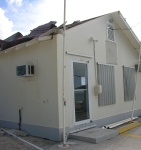
No jailhouse on the Brac
 (CNS): Police Commissioner David Baines told Cayman Brac residents at a community meeting Monday that there is currently no jail on island, and said the police officers had to deal with an unworkable arrangement where they “babysat” criminals until they could be taken off the island to Grand Cayman. He said it was completely unacceptable and he had told his officers, “If you’ve got someone who’s riled, there’s plenty of palm trees outside – handcuff them to one of those.” (Left: Brac police station after Hurricane Paloma)
(CNS): Police Commissioner David Baines told Cayman Brac residents at a community meeting Monday that there is currently no jail on island, and said the police officers had to deal with an unworkable arrangement where they “babysat” criminals until they could be taken off the island to Grand Cayman. He said it was completely unacceptable and he had told his officers, “If you’ve got someone who’s riled, there’s plenty of palm trees outside – handcuff them to one of those.” (Left: Brac police station after Hurricane Paloma)
While noting that they should make sure they had water and were in the shade, he said, “If people are a risk and a potential danger, we need to take control of the situation.”
On the other hand, he said that he had looked at the cells at the police station at the Creek, which was severely damaged by Hurricane Paloma in November of last year, and thought they were the best in the Cayman Islands. He said the cell blocks in George Town were decrepit and should be condemned, a point he had made when interviewed for the job of commissioner, he said. Noting that we have an obligation to treat people with respect, he pointed out that they were not just used for prisoners but for mental health patients as well, since there was no other facility.
“Some of them are high risk individuals capable of self harm and we are putting them into facilities that are dangerous in themselves,” he said, adding that three of his officers had been badly assaulted in existing facilities. “They are crumbling, poor and unfit for purpose,” he said.
The commissioner said that government had set aside $250,000 to repair the Brac police station. However, he wondered if that was “merely puttinga band-aid over some really problematic issues” that existed with the old building. He said the RCIPS was trying to influence a longer term strategy of getting a new building in the heart of the island, where all districts were equally accessible, and that they were meeting with planners Tuesday to discuss the issue. However, he was not blind to the financial state the government is in, he said, and if cuts had to be made, he would rather they be “in cars and estate than officers.”
“Buildings, cars and computers don’t make people safe, but uniformed officers responding and turning up when you need them do make a difference,” he said, noting that the Brac, like all districts was already short of officers.
The suggestion of a new station found support from Brac residents, and one resident thought that a new police building could be combined with a new fire station. Area Commander, Chief Inspector Malcolm Kay, speaking at the first RCIPS community meeting since taking up the position, noted that the police had been using space in the UCCI building since the hurricane, but that the university now needed that space back.
Listing the crime statistics for the first six months of the year compared to the same period last year, Chief Inspector Kay said they showed a rise, but this was partly due to improvements in documenting crime. He said that when he arrived in January, one of the first things he noticed was that far more went on in Cayman Brac than had previously been reported to senior officers in Grand Cayman. These were not major crimes, but the Brac police dealt with far more incidents on a day to day basis that was documented the way he felt it should be.
Paloma was also a contributing factor to the increase, said Kay, partly because of an influx of people to help with the clean up, and partly because of additional stress caused by the hurricane. There was a significant increase in speeding tickets, which had more than doubled.
There was also a significant rise in violent crimes, up from 11 to 35, which Kay later said were mostly related to domestic abuse, which is a huge issue on the island, he said. With the domestic violence officer for the Brac having just returned to the UK, the chief inspector said that two officers had been identified for DV training. Kay assured residents that there would be arrests where it was obvious that domestic violence has taken place, and while police would try to prosecute wherever possible even without the cooperation of the victim, this made a conviction more difficult and the charge often had to be reduced from assault to a breach of the peace.
The other issue, he said, was a safe house on the Brac for victims of domestic abuse. A member of the Brac Business and Professional Women’s Club noted that they were trying to tackle this issue but lacked the resources and manpower available in Grand Cayman.
Two female Brac residents told of a man who had harassed and threatened both of them as well as other women on the island. One woman claimed this had been going on for five years and she had made numerous complaints to the police, who had responded about 98% of the time, she said. It had got to the point where she carried a piece of wood in her car for protection. She had been told it was with the legal department – but this had been the case for two years.
Baines said he was still learning the difference between UK and Cayman law, but that the crime of Breaching the Peace was common to both, and the man could be arrested every time he harasses. That would allow the magistrates to bind him over for good behaviour, which means he must promise that he won’t do a set list of actions. If he then breaches that, then increasingly the magistrates can impose further sentences in court because they have failed to comply with the directives, Baines explained.
Kay said that if anyone has an issue that they don’t think is being dealt with properly, they could come and see him or go higher to Superintendent Adrian Seales, who was also at the meeting. “We all have a boss,” he noted.
The issue of speeding was also raised by a high school teacher, who said that cars and trucks drove through the school area, which has a 25mph limit, at much higher speeds.
Baines suggested an innovative approach, which had been successful in the UK in a similar situation, whereby students (wearing high glow jackets) accompanied police who were patrolling the area with a radar gun. When the drivers were stopped, they were asked a set of questions by the students, such as, what would you do if you hit us? Or, how you would feel if your child were killed by a speeder? Baines said the drivers go away chastised, and the idea was that rather than just get a fine, they actually thought about what they had done.
Pointing to another traffic issue, Baines said, “No one seems to be able to drive here without having a phone to their ear.” The problem that had been dealt with in the UK by having a fixed fine of £100, he said.
The lack of street lights in some areas – another remnant of Paloma – was also raised, and although this was not the responsibility of the police, the commissioner said that such things did impact crime. Along with the issue of littering, which was also raised by residents, and such things as unkempt and overgrown bush, dogs roaming wild and graffiti, Baines noted that this affected whether people viewed the area as a safe environment.
With the Brac down to 8 constables when it should have 12, Kay said they don’t have the resources to have a special beat officer. However, he believes that every officer should be highly visible and a part of the community. He also noted that PC Netty Bulgin woul be taking up the DARE programme in Cayman Brac primary schools next school year.
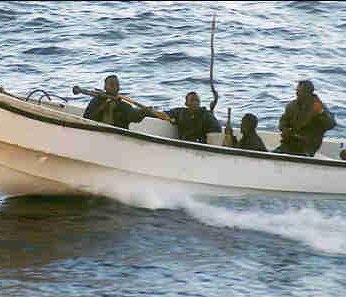
Somalis charged over piracy
 (BBC): Twelve suspected Somali pirates have been charged with hijacking a Yemeni oil tanker earlier this year, according to Yemeni authorities. The suspects were seized when Yemeni forces retook control of the vessel, which had been attacked while sailing from the port of Mukalla to Aden. One of the tanker’s crew was killed during the hijacking and a second remains missing. The Somalis are the latest suspected pirates to face justice in Yemen. Earlier this month, 22 Somalis went on trial after being handed over to Yemen by international naval forces.
(BBC): Twelve suspected Somali pirates have been charged with hijacking a Yemeni oil tanker earlier this year, according to Yemeni authorities. The suspects were seized when Yemeni forces retook control of the vessel, which had been attacked while sailing from the port of Mukalla to Aden. One of the tanker’s crew was killed during the hijacking and a second remains missing. The Somalis are the latest suspected pirates to face justice in Yemen. Earlier this month, 22 Somalis went on trial after being handed over to Yemen by international naval forces.
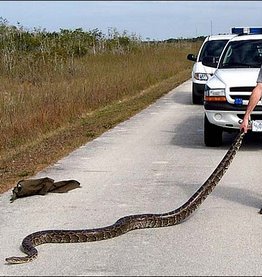
Python’s hunted in Florida
 (National Geographic): For the first time, Florida is allowing select hunters to kill pythons in the wild. The non-native snakes are believed to number in the tens of thousands and are killing endangered species, experts say. The state of Florida has issued permits to certain hunters allowing them to catch pythons, which are wreaking havoc with native flora and fauna in the Everglades National Park. The Florida Fish and Wildlife Conservation Commission is allowing a few permitted snake experts to begin hunting, trapping and killing the snakes.
(National Geographic): For the first time, Florida is allowing select hunters to kill pythons in the wild. The non-native snakes are believed to number in the tens of thousands and are killing endangered species, experts say. The state of Florida has issued permits to certain hunters allowing them to catch pythons, which are wreaking havoc with native flora and fauna in the Everglades National Park. The Florida Fish and Wildlife Conservation Commission is allowing a few permitted snake experts to begin hunting, trapping and killing the snakes.

Stanford women are standing by their man
 (Reuters): Most men would not want to be in a room with their estranged wife, current girlfriend and two former mistresses, but Allen Stanford is not most men. The women, who have enjoyed million-dollar homes and luxury lifestyles, appear united in their loyalty to the Texas financier who faces criminal charges for an alleged $7 billion (4.2 billion pound) Ponzi scheme. Stanford’s lawyer, Dick DeGuerin, cites the support of Stanford‘s unconventional extended family in arguments to overturn a ruling keeping Stanford in a federal detention centre without bail.
(Reuters): Most men would not want to be in a room with their estranged wife, current girlfriend and two former mistresses, but Allen Stanford is not most men. The women, who have enjoyed million-dollar homes and luxury lifestyles, appear united in their loyalty to the Texas financier who faces criminal charges for an alleged $7 billion (4.2 billion pound) Ponzi scheme. Stanford’s lawyer, Dick DeGuerin, cites the support of Stanford‘s unconventional extended family in arguments to overturn a ruling keeping Stanford in a federal detention centre without bail.
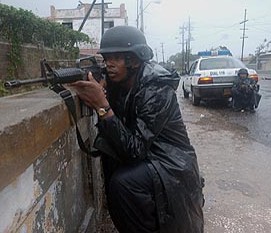
NGO warns Jamaica over deep-rooted violence
 (CNS): Although Amnesty International has welcomed initiatives by the Jamaican Government to tackle the country’s public security crisis, it has warned that success would only be measured in terms of lives saved and people lifted out of poverty. The NGO said there was still an alarming rate of killings in the country as well as serious human rights violations. The organisation’s assessment is part of a 32-page report, entitled ‘Public security reforms and human rights in Jamaica’, published today (21 July).
(CNS): Although Amnesty International has welcomed initiatives by the Jamaican Government to tackle the country’s public security crisis, it has warned that success would only be measured in terms of lives saved and people lifted out of poverty. The NGO said there was still an alarming rate of killings in the country as well as serious human rights violations. The organisation’s assessment is part of a 32-page report, entitled ‘Public security reforms and human rights in Jamaica’, published today (21 July).
The report evaluates the Jamaican Government’s plans to tackle the country’s deep rooted violence, human rights violations and impunity. Amnesty said that Jamaica has extremely high rates of violent crime. According to police statistics, in 2008 alone there were 1,611 murders in Jamaica – in a population of only 2.7 million. Most of the victims live in socially-excluded inner-city areas. In 2008 the proportion of child victims grew significantly.
During 2008, an additional 224 people were fatally shot by police officers. It is estimated that in the first five months of 2009 alone, police killings increased by 58%, however, police officers are rarely punished for these crimes, the NGO stated. No police officer has had any convictions brought against him since 2006, and only four convictions between 1999 and 2009 have been laid down out of a total of more than 1,700 reports of fatal shootings.
‘The outlook for Jamaica is still grim with alarming rates of killings and almost no convictions of state agents accused of serious human rights violations,” said Amnesty International Americas Deputy Director, Kerrie Howard. “’What is different now is that we finally see initiatives that might lead to real change. Jamaicans cannot afford to wait any longer. Initiatives have to be implemented and produce concrete results soon. The lives of thousands depend on that."
Amongst the government’s proposals are plans to reform the Jamaican Constabulary Force, to modernise the justice system, and to develop a community safety and security policy that would tackle some of the issues behind the high levels of violence in the country. Bilateral and multilateral donors have committed to supporting many of the recommendations included in these plans.
Amnesty International also reviewed the proposal to reform the Jamaican Constabulary Force. In 2008 a strategic review of the force resulted in 124 recommendations that were accepted by the government. Some of the key objectives include the improvement of the force’s professionalism, responsiveness and accountability.
The organisation praised the project, Justice System Reform, to undertake a comprehensive review of the justice system and develop strategies and mechanisms for its modernisation. In June 2007, the Justice System Reform Task Force issued a detailed set of recommendations which, if implemented, could significantly improve access to justice for victims of criminal violence and police abuses.
“The government has embarked on a process of reform that if correctly and fully implemented could remove many of the factors contributing to the public security crisis and drastically improve respect for human rights in Jamaica.” Howard added.
Two top civil service spots filled
(CNS): While government remains completely silent on the fate of former Chief Officers Angela Martins and Diane Montoya the Chief Secretary and Head of the Civil Service Donovan Ebanks, has appointed JenniferAhearn as Chief Officer, for the Ministry of Health, Environment, Youth, Sports and Culture and Dorine Whittaker as Chief Officer in the Ministry of Community Affairs and Housing. According to government there were 20 applications for the posts.
As part of an open recruitment process four candidates were interviewed by a selection panel consisting of Donovan Ebanks, Peter Gough, Strategic Advisor and Nick Freeland from PricewaterhouseCoopers.
“It is particularly pleasing to see these officers, and ladies, move up to these senior posts,” said Ebanks. “Both have proved themselves admirably at the deputy level and earned these advances. Their promotions will open up opportunities in the public service for other deserving persons”
Dorine Whittaker has been in public service for 23 years, and has served at ministry level for thirteen years, eleven of which as deputy chief officer. On returning from college she became a business studies teacher at the Cayman Islands High School/John Gray High School and a part-time lecturer at the Community College of the Cayman Islands (now known as the University College of the Cayman Islands). In addition she was Head of House for five years.
She became Head of Business Studies and served for four years in that capacity and she said she was delighted with the opportunity to serve as Chief Officer.
Jennifer Ahearn has worked in Government for over 12 years starting as a Planning Assistant. She was promoted to Assistant Director MRCU and then Deputy Chief Officer in the Ministry of District Administration, Planning, Agriculture and Housing.
“The Ministry’s subject matters are diverse, but undoubtedly interconnected,” she said about her new post. “I am looking forward to applying the knowledge and experience I have gained in the civil service to ensure that the ministry delivers the services needed in these challenging times.”